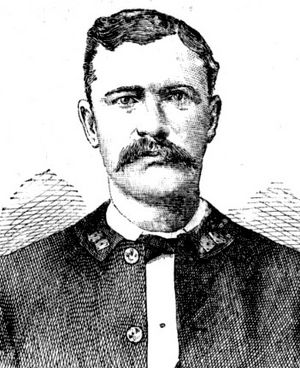William Evans (Medal of Honor) facts for kids
Quick facts for kids
William Evans
|
|
|---|---|

An illustration of Corporal William Evans after the Battle of the Little Bighorn.
|
|
| Born | 1852 Annagh, Ireland |
| Died | November 26, 1893 (aged 41) Greeley, Colorado, United States |
| Place of burial |
Linn Grove Cemetery
|
| Allegiance | United States of America |
| Service/ |
United States Army |
| Years of service | 1875–1881 |
| Rank | Corporal |
| Unit | 7th U.S. Infantry |
| Battles/wars | Indian Wars Black Hills War |
| Awards | Medal of Honor |
William Evans (1853 – November 26, 1893) was an Irish-born soldier. He served in the U.S. Army with the 7th U.S. Infantry. He was part of the Black Hills War.
Evans took part in battles against the Sioux people in the Montana Territory. From July 9–14, 1876, he bravely volunteered for a very important mission. He carried critical messages between two generals, George Crook and Alfred Terry. For his brave actions, he later received the Medal of Honor.
William Evans's Life Story
William Evans was born in Annagh, Ireland, in 1851. He later moved to the United States. On April 26, 1875, he joined the U.S. Army in St. Louis, Missouri.
From there, Evans went to Newport, Kentucky. He was then sent to the frontier, which was the wilder part of the country. He served with the 7th U.S. Infantry. Within a year, he was fighting against the Sioux in the Montana Territory. This was during the Black Hills War.
A Dangerous Mission
After a big battle called the Battle of the Little Bighorn, Evans and two other soldiers, Pvts. Benjamin F. Stewart and James Bell, volunteered for a dangerous job. They needed to carry important messages between General George Crook and General Alfred Terry.
Two other attempts to deliver these messages had failed. Evans and his friends had to travel about 100 miles. This area was controlled by an estimated 2,000 Sioux and Cheyenne warriors.
Traveling by Night
Between July 9 and 14, 1876, they traveled back and forth. They went between General Crook's camp and General Terry's camp. To stay safe, they hid during the day. They traveled only at night. This way, they were able to avoid the Sioux war parties.
For their incredible bravery, all three men received the Medal of Honor. This is the highest military award in the United States.
Later Years
Evans stayed in the military. He joined again at Camp Baker on November 2, 1878. On November 30, 1880, he was promoted to the rank of corporal.
He spent the last three years of his life working as a farmer. He lived in Greeley, Colorado. William Evans passed away there on November 26, 1893. He was buried at Linn Grove Cemetery.
See also
 | Dorothy Vaughan |
 | Charles Henry Turner |
 | Hildrus Poindexter |
 | Henry Cecil McBay |

